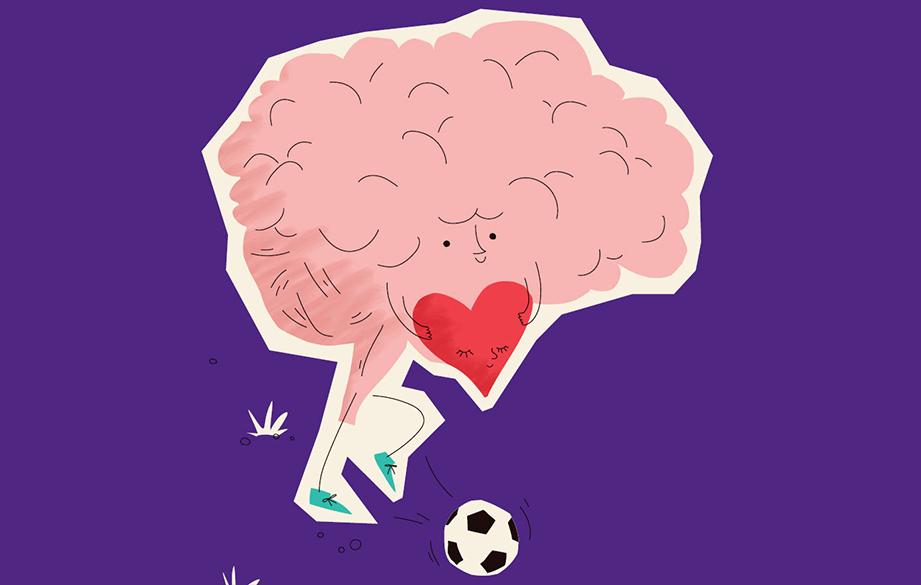Being Active Boosts Kids’ Brain Health
June 19, 2018 | News

Kids Brain Health Network supports findings in the 2018 ParticipACTION Report Card on Physical Activity for Children and Youth. Released today, the Report Card gave Canadian kids a score of D+ for Overall Physical Activity. This grade is particularly alarming considering that this year’s Report Card also highlights important connections between physical activity and kids’ brain health.
Only 35 per cent of 5- to 17-year-olds and 62 per cent of 3- to 4-year-olds are getting the recommended physical activity levels for their age group, the report card found, and may be having an impact on the health of their brains – kids may be less attentive, moody and not meeting their full potential both in and out of the classroom.
“Regular physical activity, even in short bursts, can help kids’ brains on many levels,” said Dr. Mark Tremblay, Chief Scientific Officer, ParticipACTION Report Card and Director of the Children’s Hospital of Eastern Ontario Research Institute’s Healthy Active Living and Obesity Research Group (CHEO-HALO).
“Kids who are more active have increased self-esteem and are generally more focused and less stressed compared to their less active peers,” adds Dr. Tremblay. “For example, students who exercise before a test show stronger brain function than those who don’t. Furthermore, kids with brain-based disabilities, such as autism spectrum disorder or ADHD, may experience even greater improvements in learning and thinking as a result of regular physical activity.”
This year’s Report Card was released in concert for the first time with an evidence-informed Expert Statement on Physical Activity and Brain Health in Children and Youth. The Expert Statement was developed by a team of developmental neuroscientists and psychologists, exercise scientists, clinicians and practitioners, including KBHN Scientific Director Dr. Dan Goldowitz and Principal Investigators Dr. Jean-Paul Collet and Dr. Jill Zwicker. The Statement emphasizes that for better brain health – including cognition, brain function and mental health – all children and youth should be physically active on a regular basis.
“Kids Brain Health Network funds multiple studies focused on evaluating the impacts of physical activity – and access to activity – on children with neurodisabilities and their families,” says Dr. Goldowitz. “Playing key roles in the development of the Expert Statement and the guideline itself were important to the Network, given our mandate to translate our findings into practice.”
“Our research has shown that attending community-based adapted programs is beneficial for children with autism, cerebral palsy, ADHD, Down syndrome, developmental coordination disorder, FASD and other brain-based disabilities, which represents up to 100,000 children in BC alone,” says Dr. Collet, a Professor in UBC’s Department of Pediatrics whose work currently focuses on physical activity programs. “Over time, children improved their motor performance as well as psychological and social cognition and self-perception, which led to better functioning in daily life and integration.”
“Children with neurodevelopmental disabilities have the most to gain from physical activity for their brain health, but they are less physically active than their peers,” adds Dr. Zwicker, Assistant Professor in Occupational Therapy at the University of British Columbia. “We need to develop and support adapted programs for these children and youth.”
Other key contributors from BC were Mojgan Gitimoghaddam, Guy Faulkner, Ali McManus and Sarah Moore.
The lowest grades in this year’s Report Card are a D+ for Overall Physical Activity, D for Sedentary Behaviours and F for the 24-Hour Movement Behaviours. Despite common knowledge of the health benefits of kids moving more, turning away from screens, getting off the couch and breaking a sweat, most of them aren’t, but now they have another pressing reason to do so – for their brain health.
“In order to help support the development of strong, healthy brains we need to encourage kids to get enough daily heart-pumping physical activity,” said Elio Antunes, President and CEO, ParticipACTION. “Research shows that active kids perform better in school and are generally happier. We need to be active role models and set kids up to succeed. I understand that modern life can get in the way of making the time to get active, but I encourage all families to try. And, get outdoors more because it is a powerful antidote for kids facing stress.”
Other grades assigned in the Report Card include:
• “D” for Active Play & Leisure Activities
• “D-” for Active Transportation
• “B” for Organized Sport Participation
• “C-” for Physical Education
• “B+” for Sleep
• “D+” for Physical Literacy
• “D” for Physical Fitness
• “C+” for Family & Peers
• “B-” for School
• “B+” for Community & Environment
• “C+” for Government
Recommendations on how to increase opportunities for physical activity and improve kids’ brain health, including those with brain-based disabilities, can be found within the Expert Statement.
To download the 2018 ParticipACTION Report Card Highlight Report, including the Expert Statement, or Full Report, please visit www.participACTION.com/reportcard.